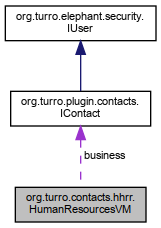◆ getBusiness()
| IContact org.turro.contacts.hhrr.HumanResourcesVM.getBusiness |
( |
| ) |
|
◆ getBusinessModel()
| List<IContact> org.turro.contacts.hhrr.HumanResourcesVM.getBusinessModel |
( |
| ) |
|
Definition at line 79 of file HumanResourcesVM.java.
81 contact = Authentication.getIContact();
84 ContactList list =
new ContactList();
87 list.sort((o1, o2) -> {
88 return o1.getName().compareTo(o2.getName());
◆ getModel()
Definition at line 70 of file HumanResourcesVM.java.
71 if(business !=
null && business.
isValid()) {
72 model =
new HumanResourcesSet(((Contact) business.
getContact()).getWorkerRelations());
74 model =
new HumanResourcesSet(Collections.EMPTY_SET);
◆ isEditable()
| boolean org.turro.contacts.hhrr.HumanResourcesVM.isEditable |
( |
| ) |
|
◆ save()
| void org.turro.contacts.hhrr.HumanResourcesVM.save |
( |
| ) |
|
Definition at line 56 of file HumanResourcesVM.java.
57 if(editable && model !=
null && !model.isEmpty()) {
58 new ContactsPU().saveCollection(model);
◆ setBusiness()
| void org.turro.contacts.hhrr.HumanResourcesVM.setBusiness |
( |
@BindingParam("business") Object |
business | ) |
|
Definition at line 46 of file HumanResourcesVM.java.
47 if(business instanceof IContact) {
48 this.business = (IContact) business;
50 editable = contact.
isHHRR((IContact) business) || contact.
isAdmin();
The documentation for this class was generated from the following file:



